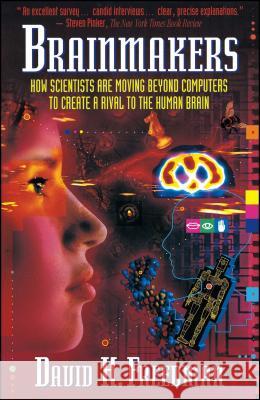Brainmakers: How Scientists Moving Beyond Computers Create Rival to Humn Brain » książka
Brainmakers: How Scientists Moving Beyond Computers Create Rival to Humn Brain
ISBN-13: 9780671510558 / Angielski / Miękka / 1995 / 224 str.
Join David Freedman as he takes you on a fascinating tour behind the scenes at laboratories around the world as top researchers race to create revolutionary "thinking machines" that may one day lead to a new form of intelligence.
The subject of fantasy and skepticism for centuries-- from William James's mechanical bride to 2001's Hal to Star Wars' R2D2-- artificial intelligence has been limited to number-crunching computers that are"smart" only in highly specific domains like chess-- until now. "Brainmakers" is an eye-opening, mind-expanding, and mind-blowing journey through laboratories engaged in cutting-edge research into neuro-science and robotics. Inside, you'll discover:
MIT's Attila, a 3.6-pound, six-legged robot that learns as it interacts with its surroundings.
Japan's efforts to grow brain cells on chips and construct a "wiring diagram" of the human brain
UCLA's "robot farm", where robots will be "bred" for intelligence.
In exciting yet accessible detail, Freedman shows how this research has moved into a new realm that transcends computer science, combining neuroscience, mircobiology, evolutionary biology, and zoology. Modeled after natural rather than artificial intelligence, thinking machines may soon develop powers that rival-- or exceed-- those of the human brain.
Join David Freedman as he takes you on a fascinating tour behind the scenes at laboratories around the world as top researchers race to create revolutionary "thinking machines" that may one day lead to a new form of intelligence.
The subject of fantasy and skepticism for centuries-- from William Jamess mechanical bride to 2001s Hal to Star Wars R2D2-- artificial intelligence has been limited to number-crunching computers that are"smart" only in highly specific domains like chess-- until now. "Brainmakers" is an eye-opening, mind-expanding, and mind-blowing journey through laboratories engaged in cutting-edge research into neuro-science and robotics. Inside, youll discover:
MITs Attila, a 3.6-pound, six-legged robot that learns as it interacts with its surroundings.
Japans efforts to grow brain cells on chips and construct a "wiring diagram" of the human brain
UCLAs "robot farm", where robots will be "bred" for intelligence.
In exciting yet accessible detail, Freedman shows how this research has moved into a new realm that transcends computer science, combining neuroscience, mircobiology, evolutionary biology, and zoology. Modeled after natural rather than artificial intelligence, thinking machines may soon develop powers that rival-- or exceed-- those of the human brain.











